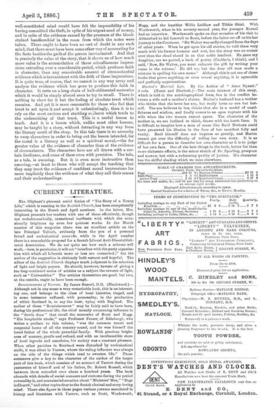Reminiscences of Yarrow. By James Russell, D.D. (Blackwood.)— Although not
in any sense a very remarkable book, this is an interest- ing one, and belongs to the class of local histories, tinged, and in some instances suffused, with personality, in the production of which Scotland is, to say the least, vying with England. The author of these " Reminiscences " may be fairly said to have been, during his professional life, the chief morally sweetening influence in the " dowie dens" that recall the memories of Scott and Hogg. "His hospitable abode," says Professor Fraser, of Edinburgh, who writes a preface to this volume, " was the common resort and congenial home of all the country round, and he was himself the loved father of the whole parochial family. With gracious bright- ness of manner,. gentle and refined, and with an inexhaustible store of local legends and anecdotes, his society was a constant pleasure. When other parishes in Scotland were disturbed by ecclesiastical strife, it was silent in Yarrow, where the ruling influence was always on the side of the things which tend to sweeten life." These sentences give a key to the character of the author of the larger part of this book, which consists of an account of Yarrow during the pastorates of himself and of his father, Dr. Robert Russell, which between them extended over about a hundred years. The book abounds with details of social manners and customs during the period covered by it, and contains information about "Ministers' Men," "Dogs in Church," and other topics dear to the Scotch clerical and story-loving mind. There also figure in these pages various persons associated in history and literature with Yarrow, such as Scott, Wordsworth,
Hogg, and the humbler Willie Laidlaw and Tibbie Shiel. With Wordsworth, when in his seventy-second year, the younger Russell had an interview. Wordsworth spoke on that occasion of his visit to Abbotsford to bid farewell to Scott, before the latter set off on his last journey to the Continent. "Sir Walter was sadly changed from the days of other years. When he got upon his old stories, he told them very
much with his former humour and zest, but the story was no sooner over than the cloud closed in on that noble intellect. He gave my daughter, ere we parted, a book of poetry (Crabbe's, I think), and I said, Now, Sir Walter, you must enhance the gift by writing your name in the volume.' He did so; but the dear old man made a mistake in spelling his own name." Although this is not one of those books that prove anything, or even reveal anything, it is agreeable and perfectly unpretentious.


































 Previous page
Previous page